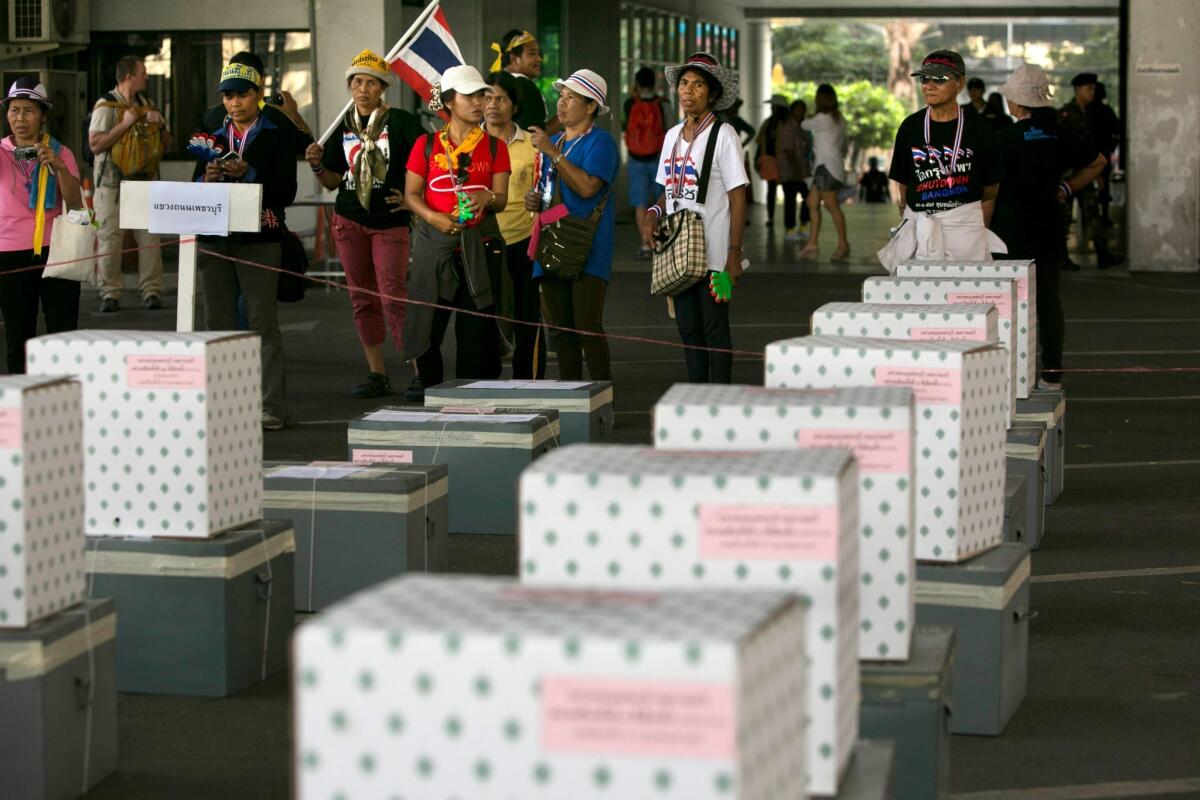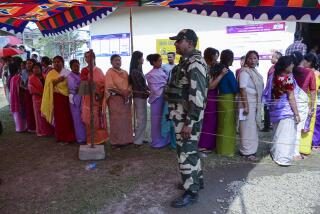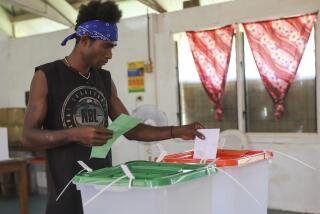Thailand: Millions kept from voting by anti-government protests

BANGKOK — Protesters blocked polling stations and obstructed ballot boxes in parts of Bangkok and southern Thailand on Sunday, disrupting a contentious national election that appeared unlikely to resolve the country’s long-running political standoff.
In a coordinated campaign by anti-government demonstrators, some 6 million voters were prevented from casting ballots, according to election officials.
Thailand’s embattled prime minster, Yingluck Shinawatra, had called the election in December, hoping it would bolster her slipping grip on power. Although Yingluck’s Peau Thai party is expected to receive a comfortable victory when results are announced, it seemed unlikely that enough people had voted or that enough parliamentary seats would be filled to allow her to form a new government.
Officials said it was possible that voting in areas that were disrupted Sunday could be rescheduled, although protesters have vowed to continue their campaign to undermine the election and announced plans to march through Bangkok again on Monday.
Thai election officials said about 10,000 of the 93,000 voting stations across the country were unable to open, the majority in the south.
Asked by reporters Sunday morning if the election could resolve her country’s political standoff, Yingluck appeared at a loss for words. “I can’t say anything,” she said.
A gunfight Saturday near a Bangkok airport raised concerns about further violence Sunday, but Bangkok was largely peaceful as people voted where they could. In Din Daeng district, protesters blockaded a polling center, leading to a tense standoff with voters Sunday morning. Protesters eventually left the area, but later, after angry voters pushed through a gate to the polling station, they were told that they could not vote due to security concerns.
Tarn Chotikiviboon was among around 80 would-be voters who lined up to register a complaint with police at the polling station because she could not vote.
“Today is important to show the world that many people in Thailand want to vote,” she said.
The latest wave of protests backed by Thailand’s main opposition – the Democrat Party, which boycotted Sunday’s balloting – has lasted about three months, led to closures of government offices in Bangkok and resulted in the deaths of 10 people in street violence. Police have been reluctant to confront the demonstrators, raising concerns about a power vacuum that could prompt Thailand’s army to intervene.
Although Thailand has had 18 coups or attempted coups since 1932, the army is believed to be unlikely to step in due to to concerns that Yingluck’s supporters would resist the move and because Thailand’s last military junta struggled in running the country.
Yingluck, the sister of ousted former prime minister Thaksin Shinawatra, called the election several weeks ago in an effort to re-legitimize her caretaker government, which has been besieged by protests since November. The protesters deride Yingluck as a puppet of her brother — who was hit with corruption charges in 2008 — and are seeking an unelected council to govern Thailand and implement reforms before any election can be held.
Across opposition strongholds in southern Thailand, home to 9 million of Thailand’s 66 million people, protesters prevented ballot papers from being distributed and blockaded polling stations to stop voting.
Government supporters contend that the protesters — led by Suthep Thaugsuban, who has also been accused of corruption — are out to derail Thailand’s democratic system because the Democrat Party hasn’t won an election in over two decades. The opposition views elections as not winnable due to the governing party’s strong support in northeastern Thailand, which has twice the population of the south.
The protesters see government rice subsidies, which heavily benefit the northeast, as a corrupt use of public money to bribe Yingluck’s core supporters. Even some erstwhile government supporters have turned against Peau Thai due to the rice program, which has run out of money, leaving farmers unpaid and prompting an investigation into the subsidies.
In central Bangkok, the constituency of Democrat Party leader Abhisit Vejajiva, voters gathered early Sunday morning to cast ballots despite the opposition’s boycott. Voranan Vivorakij, who stood in line at 8 a.m., said voting was “my human right and my duty.”
Asked if she was disappointed that her area’s highest-profile voter was boycotting the election, Voranan said simply, “A boxer should fight on the stage. If he [does] not respect the rules, don’t expect respect.”
Roughneen is a Times special correspondent.
More to Read
Start your day right
Sign up for Essential California for news, features and recommendations from the L.A. Times and beyond in your inbox six days a week.
You may occasionally receive promotional content from the Los Angeles Times.






